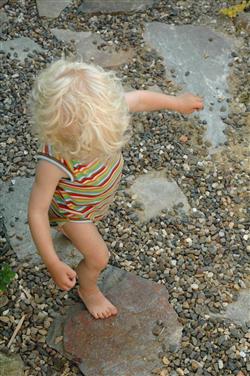Join a community of readers who are committed to Jewish stories
Sign up for JBC’s Nu Reads, a curated selection of Jewish books delivered straight to your door!
 Recently, one of my writing students turned in a story featuring an adorable, vulnerable child whose blue eyes were “wide with wisdom” or something similarly icky. Although I otherwise liked the story, I warned my student – my entire class, in fact – against this particular cliché, the urchin who spouts soul-ennobling maxims while either bringing the adults together or putting them in their place. This child is usually between the ages of four and eight, preternaturally mature, humorless, and almost always blond. I call him the Golden Child, and he annoys the crap out of me.
Recently, one of my writing students turned in a story featuring an adorable, vulnerable child whose blue eyes were “wide with wisdom” or something similarly icky. Although I otherwise liked the story, I warned my student – my entire class, in fact – against this particular cliché, the urchin who spouts soul-ennobling maxims while either bringing the adults together or putting them in their place. This child is usually between the ages of four and eight, preternaturally mature, humorless, and almost always blond. I call him the Golden Child, and he annoys the crap out of me.
After I finished teaching that day, I met my four-year-old son for lunch in the campus garden. My son is blond. My son is blue-eyed. My son has a good sense of humor, but still: my creative writing students saw us in the garden and said, kindly, that it looked like I had a Golden Child of my own. I smiled through my cringe. They were right: Nathaniel is golden, as all-American as a fourth of July firework. I, on the other hand, look like I was just crowned Miss Shtetl 2013. In other words, my son doesn’t look like me at all, and he doesn’t look particularly “Jewish.”
I have a strange relationship with my son’s all-American looks. Of course I think he’s beautiful, but I’m always surprised at how frequently people comment on his appearance, and especially how people admire him for his blondness. I’ve never been blond in my life, so before Nathaniel was born I’d never witnessed, really, the power of blond hair, even when it’s on the head of a little boy. People like to touch it, pat it, remark on its lemony highlights. People have even praised me for it, as though it was something I gave him on purpose. And more than once, people have asked me if his father is Jewish, if his father is the source of the kid’s lucky looks.
These sorts of comments bring up all kinds of funny feelings in me . On the one hand, I want to shake the person: Jews look like all sorts of things, dummy, including like Captain America over here. On the other hand, I want to acknowledge my own pride in this beautiful blond boy — blond like the Vikings, blond like the sun. And on the other other hand, I sometimes wonder if my son’s connection to Judaism will be affected by what he looks like. Already the threads feel looser in him than they are in me: no, his father was not born Jewish, and yes, the blond hair comes from his father’s side of the family.
Is it easy for me to be Jewish because I look so classically Semitic? Will it be harder for him because he doesn’t? And what does it mean that I even think about these things?
On Friday night we light candles; on Jewish holidays we celebrate with family. Last fall we ate in a sukkah together, and we look forward to doing that again. This fall he’ll start Hebrew School at our wonderful synagogue. Still, like many Jewish kids – like me when I was his age – he’d rather celebrate Christmas than Hannukah and has no real interest in being different from his friends. And unlike me, with my stereotypically Jewish face, my Jewish name, he’d have an easy time passing one day for someone he isn’t.
For the moment, however, my Golden Child is a font of dubious knowledge. “I’m not blond!” he says. “I’m brown like you!” This is patently untrue, but strangely, it provides some solace. He wants to be brown-haired because he wants to look like me, he says — because he’s my son and we’re family. How wonderful to hear him say this! Even if it’s ridiculous. My son is not brown-haired like me, but he is Jewish, like me. He loves his family, like I do. “See!” he says. “I’m just like you!”
Just like all children and their parents, he is and he isn’t. But occasionally, despite the cliché of it, he is wise beyond his years.
Read more about Lauren Grodstein here.
Lauren Grodstein is the author of Our Short History, The Washington Post Book of the Year The Explanation for Everything, and The New York Times bestselling A Friend of the Family, among other works. Her stories, essays, and articles have appeared in various literary magazines and anthologies, and have been translated into French, German, Chinese, and Italian, among other languages. Her work has also appeared in Elle, The New York Times, Refinery29, Salon.com, Barrelhouse, Post Road, and The Washington Post. She is a professor of English at Rutgers University-Camden, where she teaches in the MFA program in creative writing.